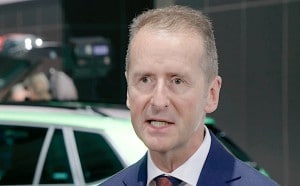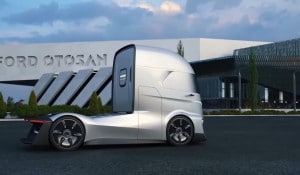
VW CEO Herbert Diess had seen an opportunity to hold down costs while tapping into a large supplier network with the planned Turkish plant.
Volkswagen has paused work on a $1.4 billion plant in Turkey and, as that country’s troops press their assault on Kurdish-held portions of Syria, VW is warning it could abandon the plant entirely.
Even before the invasion began last week, Volkswagen had cautioned that it would move ahead on the project only :if there isn’t a last-minute problem.”
Though the German automaker hasn’t made a final decision, the delay in the project comes as the latest repercussion following Turkey’s decision to attack the Kurdish forces it had long accused of being “terrorists.” Among other things, U.S. Pres. Donald Trump announced Monday the suspension of bilateral talks with Turkey that had been expected to lead to a $100 billion trade deal. A 50% tariff on imported Turkish steel also has been put in place, along with sanctions on a number of senior Turkish officials.
(Volkswagen Looking to Monetize its EV Technology)
“I’m fully prepared to swiftly destroy Turkey’s economy if Turkish leaders continue down this dangerous and destructive path,” said Trump, who many international observers have actually blamed for the crisis having decided to pull out the American troops that had served as a buffer between Turkey and U.S. allies, the Kurds.

The Turkish factory was expected to produce several vehicles, including the global version of the VW Passat.
For its part, Volkswagen issued a statement early Wednesday that, “The decision for the new plant was adjourned by the board of management of Volkswagen AG.” The company added that, “We are monitoring the situation carefully and are worried about the current developments.”
The new plant was expected to produce both the Volkswagen Passat and the similarly sized Skoda Superb. VW already operates a commercial vehicle facility in Turkey that produces trucks for its MAN subsidiary.
VW originally looked at several possible locations for its new facility, notably including Bulgaria. But the Turkish option had a number of potential advantages. That includes wages that start at just $460 a month.
Additionally, “Turkey has a very solid network of suppliers, including Bosch, on the ground,” German auto expert Ferdinand Dudenhoffer told website Focus Online. “And let’s not forget, we’re speaking of a potential sales market of over 80 million people.”

A number of other automakers operate in Turkey, including Ford, which developed this truck concept vehicle at its Turkish operations.
Those are some of the reasons why a number of other manufacturers, including Fiat, Ford, Hyundai, Renault and Toyota, have set up operations of their own in Turkey, collectively producing 1.3 million vehicles there last year.
Dudenhoffer and other observers believe that VW is likely to move ahead with Turkey, especially if that country pulls back its forces sometime soon.
But an extended incursion could create escalating tensions, especially with the West. Along with the United States, Turkey is facing demands to end the war from many EU members. Germany, France, Finland, Netherlands and Norway have all ordered a halt to military sales to Turkey, as well.
(Ford, VW Lock Down Expanded Alliance to Focus on EVs)
Last week’s decision by Pres. Trump set of a chain of events that has rapidly disrupted the situation not only in Syria but, potentially, across the Middle East. Hoping to fend off the Turks, the Kurds have now formed a new alliance with both Russia and the Syrian government. Meanwhile, the ongoing battles reportedly have resulted in escapes by large numbers of ISIS members, triggering concerns that the group may now try to reform.

We don’t owe Turkey or Kurdish anything. This is European problem. No US troops to fight in this conflict to protect country’s that hate USA. Also no foreign aid.